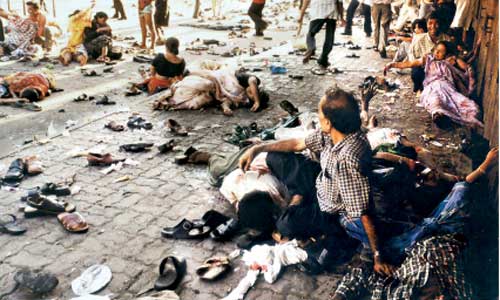AUGUST 21 GRENADE ATTACK : Victims, families still cry for justice
Victims of the August 21, 2004 grenade attack on an Awami League rally and the victim families still cry for justice as two cases for the attack are still pending with a tribunal while the plotters are yet to be identified.
Talking to New Age, they expressed their disappointment over the delayed trial and said that the ‘actual plotters’ must be identified and brought to justice.
‘I want actual plotters to be punished, not only the persons who took part in the deadly attack,’ said Yasmin Hossain, a victim still living with splinters in her body she sustained in the attack 11 years ago.
Yasmin, also the Bangladesh Mahila Awami League organising secretary, said, ‘justice should be ensured.’
Like her, Rashida Akhter, who still cannot walk properly because of injuries she sustained in the limbs, said that they wanted to see an expeditious disposal of the cases.
Rashida, also a prosecution witnesses in the cases, said that the real plotters should also be brought to justice.
Twenty four people, including former president Zillur Rahman’s wife Ivy Rahman, were killed and over 200 were injured in the grenade attack on an Awami League rally in front of its central office on Bangabandhu Avenue on August 21, 2004.
The Awami League president, Sheikh Hasina, now the prime minister, escaped the attack but the explosions caused her hearing damage.
Two cases – one for the murder and the other under the Explosive Substances Act – were filed in this connection while a judicial inquiry was also conducted.
The one-member commission of Justice Joynul Abedin, formed on the day after the attack, submitted its report to the home ministry on October 2, 2004 with 14 short- and seven long-term recommendations.
According to the report, a copy of which New Age could obtain, the intelligence agency of ‘a big foreign power’ that ‘helped the emergence of Bangladesh by cessation from Pakistan with oblique motive to make it a subservient state…orchestrated this dastardly and mindless attack.’
‘The commission has not been able to identify the actual culprits,’ the report says, ‘but it has nevertheless been able to identify the masterminds behind the incident.’
The report attributed the commission’s failure to identify the real culprits to ‘the lack of direct evidence and this was substantially contributed by the open and consistent non-cooperation of the Awami League leaders.’
The Supreme Court Bar Association had instituted an independent committee to investigate the attack. The committee published its report on February 27, 2005 without identifying the perpetrators.
The report attributed the failure to lack of access to the report of the intelligence agencies and lack of cooperation from the government.
The government had also asked for help from the US Federal Bureau of Investigation and the Interpol but their findings had never been made public.
The course for the investigation into, and the story about, the grenade attack had been changed time and again with the changes in the state power.
The Criminal Investigation Department had arrested 20 people and allegedly forced George Miah, Abul Hasem Rana and Shafiqul Islam to confess to the attack before magistrates in 2005.
In the statement, George Miah, a man from Noakhali, reportedly said that a team of 14 took part in the attack being instructed by alleged top criminals, Tanvirul Islam Joy and Subrata Bain, reportedly hiding in India and the 14, including George, was paid Tk 5,000 each for the attack.
The investigation into the two cases took a new turn after the military-controlled interim regime took over the power on January 11, 2007 with Harkat-ul-Jihad-al-Islami operations commander Mufti Abdul Hannan, arrested on October 1, 2005 in connection with the Ramna Batamul blast case, making a statement before a magistrate on November 1, 2007.
On June 9, 2008, the CID pressed charges against former BNP deputy minister Abdus Salam Pintu, Mufti Abdul Hannan and 20 others in the cases.
After recording testimonies of 61 prosecution witnesses, the Dhaka Speedy Trial Tribunal-1, on August 3, 2009 ordered further investigations into the cases following petitions filed by the prosecution after the Awami League assumed in power.
On July 3, 2011, the CID submitted supplementary charge sheets against 30 more people including BNP senior vice-president Tareque Rahman, former state minister for home Lutfozzaman Babar, the then prime minister Khaleda Zia’s political secretary Abul Harris Chowdhury, and Jamaat-e-Islami secretary general Ali Ahsan Mohammad Mojaheed.
On March 18, 2012, the tribunal framed charges against the 30, in addition to the 22 people indicted earlier, in the cases.
The tribunal judge, Shahed Nuruddin, is currently trying the cases simultaneously and has so far recorded testimonies of 176 of the 491 prosecution witnesses, mostly either serving or retired government officials.
Eighteen of the 52 accused, including Tareque, are being tried their absence, while 26 are in jail and the rest eight are on bail.
On August 3, the parliamentary standing committee on law, justice and parliamentary affairs expressed concern over delay in trial and said that the process was taking long time because of long list of prosecution witnesses.
Chief prosecutor Syed Rezaur Rahman, however, blamed the defence counsel for causing the delay unnecessary cross-examination of the witnesses.
He also said that the defence counsel had moved several time to the High Court challenging different tribunal orders causing the delay.
He, however, said that less important witnesses would be dropped as already the names of all accused came up in the testimonies.
The defence counsel for Abdus Salam and few others, Mohammad Ali, denied the allegation of unnecessary cross-examinations.
He alleged that the state mechanism was harassing the defence counsel.
‘I along with Mojaheed’s defence counsel Parvej Hossain was arrested early this year although we were not named in any cases,’ said Mohammad Ali.
The chief prosecutor, however, denied the allegation of harassment on defence counsel.
News Courtesy: www.newagebd.net











